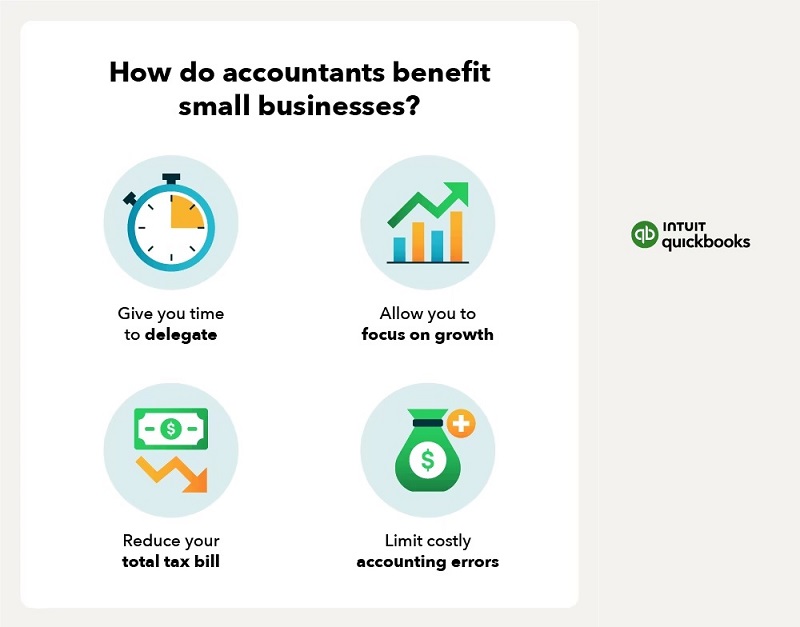
Small Business Owners! Choose the Right Way to Get Paid: Owner’s Draws vs Payroll Salaries
February 13, 2024
Essential Questions to Ask An Accountant for a Thriving Financial Future
March 6, 2024The Value of an Accountant for Your Small Business
Running a small business is an exciting and rewarding endeavor. However, navigating the complexities of finances can quickly become a significant challenge. From bookkeeping and payroll to tax filing and financial planning, managing the financial health of your business requires expertise, time, and ongoing attention.
Fortunately, you don’t have to go it alone. Hiring a qualified accountant can be a game-changer for your small business, offering valuable support and guidance in several key areas. Here are five compelling reasons why every small business owner should consider partnering with an accountant:
- Save Time and Free Up Your Resources: As a busy entrepreneur, your time is precious. Juggling financial tasks alongside core business activities can be overwhelming. An accountant can handle tasks like bookkeeping, payroll processing, and tax preparation, freeing up your time and energy to focus on what matters most – growing your business.
- Expertise and Knowledge at Your Fingertips: Tax laws and financial regulations can be complex and ever-changing. Trying to navigate these complexities without proper knowledge can lead to costly errors and missed opportunities. An accountant possesses the expertise and up-to-date knowledge to ensure your business stays compliant and maximizes its financial potential.
- Avoid Costly Errors and Penalties: Even minor accounting mistakes can have significant financial consequences, including penalties, interest charges, and legal fees. An accountant can help identify and rectify errors early on, preventing them from snowballing into bigger problems.
- Achieve Financial Confidence and Peace of Mind: Having a clear understanding of your financial health is crucial for making informed business decisions. An accountant can provide accurate and insightful reports and analyses, giving you the confidence to navigate the financial landscape with peace of mind.
- Strategic Financial Guidance and Growth Support: An accountant goes beyond just crunching numbers. They can be a valuable advisor, analyzing your financial performance, identifying areas for improvement, and providing strategic guidance to support your business growth endeavors.
By partnering with an accountant, you gain access to their expertise, save valuable time and resources, and gain the financial clarity needed to make informed decisions and propel your small business towards success.
Expanding on the 5 Reasons
Reason #1: Save Time and Free Up Your Resources
Time Management Benefits:
Imagine spending countless hours every month on bookkeeping, payroll, and tax forms, pulling your attention away from crucial strategic decisions. That’s the reality many small business owners face. An accountant can take these time-consuming tasks off your plate, allowing you to:
- Focus on core business activities: Instead of wrestling with spreadsheets, you can dedicate your time to marketing, sales, product development, and customer service, directly impacting your business growth.
- Delegate with confidence: Knowing a qualified professional is handling your finances allows you to delegate tasks with confidence, freeing yourself from the burden of micromanagement.
- Increase productivity: Studies have shown that outsourcing non-core activities like bookkeeping can significantly improve overall productivity. By removing this cognitive load, you can be more focused and efficient in your core areas.
Here’s an example: Sarah, owner of a bakery, used to spend evenings and weekends struggling with bookkeeping. Hiring an accountant freed up an estimated 10 hours per week, allowing her to focus on developing new recipes, expanding her online presence, and securing partnerships with local cafes.
Increased Focus on Core Business Activities:
As a small business owner, your passion and expertise likely lie outside of accounting. By outsourcing financial tasks, you can dedicate your valuable time and energy to the areas where you can make the most significant impact. This increased focus on core business activities can lead to:
- Improved customer satisfaction: By dedicating more time to interacting with customers and addressing their needs, you can enhance their experience and build lasting loyalty.
- Enhanced product or service offerings: Focusing on innovation and development allows you to refine your product or service, keeping ahead of the competition and exceeding customer expectations.
- Strategic decision-making: With a clear understanding of your financial situation, you can make informed decisions regarding marketing campaigns, expansion plans, and other crucial aspects of your business.
Improved Efficiency and Streamlined Processes:
An experienced accountant can help you implement efficient bookkeeping and financial systems, saving you time and resources in the long run. This may involve:
- Recommending and setting up accounting software: Choosing the right software can automate many tedious tasks, saving you valuable time and reducing the risk of errors.
- Streamlining data entry and recordkeeping: An accountant can help establish consistent and organized procedures for managing invoices, receipts, and other financial documents.
- Identifying areas for process improvement: They can analyze your existing workflows and suggest ways to streamline processes, improving overall efficiency and productivity.
By implementing these improvements, you can free up valuable resources to reinvest in your business and further its growth.

Reason #2: Expertise and Knowledge at Your Fingertips
Understanding Complex Tax Laws and Regulations:
The world of tax laws and regulations is notoriously complex and ever-changing. Keeping up with the latest updates and ensuring compliance can be overwhelming for a small business owner without a strong financial background. An accountant possesses the specialized knowledge and ongoing training to navigate these complexities, including:
- Understanding different tax codes and filing requirements: Depending on your business structure and location, you’ll need to comply with various tax regulations. An accountant can ensure you file the correct forms and meet all deadlines, avoiding potential penalties and audits.
- Staying updated on recent tax law changes: Tax laws are subject to frequent updates and changes. An accountant will proactively monitor these changes and ensure your business remains compliant with the latest regulations.
- Interpreting tax code and applying it to your specific situation: Tax codes can be ambiguous and challenging to interpret. An accountant can analyze your unique circumstances and apply the relevant tax code provisions accurately.
For example, with the recent tax code changes related to small business deductions, an accountant can help you maximize your deductions and minimize your tax liability within the legal framework.
Strategic Tax Planning and Deduction Optimization:
Beyond simply ensuring compliance, an accountant can take a proactive approach to your tax situation, helping you:
- Develop tax-saving strategies: An accountant can analyze your financial data and identify potential opportunities to minimize your tax burden legally. This might involve exploring various business structures, maximizing deductions, and utilizing available tax credits.
- Optimize deductions and minimize tax liability: They can ensure you claim all eligible deductions within permissible limits, helping you reduce your taxable income and maximize tax savings.
- Project future tax liabilities: By forecasting your potential tax obligations, an accountant can help you plan your finances effectively and avoid any unexpected tax surprises.
By implementing these strategies, you can keep more of your hard-earned profits and reinvest them back into your business, fostering sustainable growth.
Compliance and Avoiding Penalties:
Failing to comply with tax regulations can have serious consequences for your business, including:
- Significant penalties and interest charges: Non-compliance can result in hefty fines and interest charges, putting a strain on your financial resources.
- Audits and legal issues: In severe cases, non-compliance can trigger audits and potential legal consequences.
- Reputational damage: Failing to comply with tax regulations can damage your business’s reputation and deter potential investors and customers.
An accountant can help you avoid these negative consequences by ensuring you:
- Meet all filing deadlines accurately and on time.
- Maintain proper financial records and documentation.
- Stay compliant with all relevant tax regulations.
By prioritizing compliance, you can protect your business from financial risks and legal issues, allowing you to operate with peace of mind and focus on achieving your business goals.
Reason #3: Avoid Costly Errors and Penalties
Costly Mistakes and Their Impact:
Accounting errors, even seemingly minor ones, can have significant financial repercussions for your business, including:
- Financial penalties: Mistakes on tax forms or bookkeeping errors can lead to substantial fines and interest charges from tax authorities.
- Legal fees: In extreme cases, accounting errors may even result in legal issues and associated legal fees.
- Reputational damage: Public perception of financial mismanagement can damage your business’s reputation, impacting customer trust and potential partnerships.
For example, a simple typo on a tax form can trigger an audit, costing your business valuable time and resources to resolve, not to mention potential penalties.
Proactive Identification and Correction of Errors:
An experienced accountant can help you identify and rectify errors early on, minimizing their potential impact. This includes:
- Reviewing financial statements and identifying discrepancies: An accountant can analyze your financial data and identify potential errors or inconsistencies before they become major problems.
- Implementing internal controls: They can help you establish proper internal controls to minimize the risk of errors occurring in the first place, such as cross-checking invoices and receipts.
- Rectifying errors efficiently: If errors are detected, an accountant can assist in correcting them promptly and accurately, minimizing potential penalties and legal complications.
By proactively addressing errors, you can protect your business from financial losses and legal issues, allowing you to operate with greater confidence and focus on growth.
Avoiding Unforeseen Tax Liabilities and Audits:
Proper accounting practices can significantly reduce the risk of unexpected tax liabilities and audits. This includes:
- Accurate and complete record-keeping: Maintaining organized and accurate financial records makes it easier for your accountant to identify potential issues and ensure compliance with tax regulations.
- Staying organized and prepared: Having all necessary documentation readily available allows your accountant to respond to any inquiries from tax authorities efficiently, minimizing the risk of an audit.
- Understanding your tax filing obligations: An accountant can help you fully understand your tax filing requirements and ensure you comply with all relevant regulations.
By prioritizing accurate record-keeping and tax compliance, you can minimize the risk of unexpected tax liabilities and potentially stressful audits, allowing you to focus on running your business smoothly.

Reason #4: Achieve Financial Confidence and Peace of Mind
Clear Understanding of Your Financial Health:
Making informed decisions about your business requires a clear and accurate understanding of your financial health. This includes:
- Knowing your profit margins: Understanding your profitability allows you to assess your operational efficiency and identify areas for improvement.
- Monitoring cash flow: Keeping track of your cash flow ensures you have sufficient funds to cover ongoing expenses and avoid cash flow shortages.
- Understanding your financial ratios: Financial ratios, such as debt-to-equity ratio and current ratio, provide valuable insights into your financial stability and solvency.
An accountant can help you:
- Generate accurate and insightful financial reports: These reports provide a comprehensive overview of your financial performance, including income statements, balance sheets, and cash flow statements.
- Analyze your financial data and identify trends: An accountant can interpret your financial data and identify key trends that can inform your business decisions.
- Benchmark your performance against industry averages: Comparing your financial metrics to industry benchmarks can help you understand your competitive position.
By having a clear understanding of your financial health, you can make informed decisions about resource allocation, investment opportunities, and expansion plans, increasing your chances of success.
Budgeting and Forecasting for Future Growth:
Planning for the future is crucial for any successful business. An accountant can assist you in:
- Creating realistic budgets: Budgeting helps you allocate resources effectively and track your progress towards your financial goals.
- Developing financial projections: Financial projections allow you to forecast your future revenue and expenses, enabling you to make informed decisions about growth strategies and potential challenges.
- Adapting your plans as needed: As business conditions change, your financial plans may need to be adjusted. An accountant can help you revise your budget and projections to reflect these changes.
By having a solid financial plan in place, you can navigate the uncertainties of the market with greater confidence and prepare your business for sustainable growth.
Reduced Stress and Increased Focus on Business Strategy:
Managing complex financial matters can be stressful and time-consuming for busy business owners. By partnering with an accountant, you can:
- Delegate financial tasks with confidence: Knowing your finances are in the hands of a qualified professional can reduce your stress levels and allow you to focus on your core business strategies.
- Free up mental space for strategic thinking: Having a clear understanding of your financial situation and a solid financial plan in place allows you to focus your energy on developing innovative strategies to achieve your business goals.
Reason #5: Strategic Financial Guidance and Growth Support
Business Analysis and Performance Improvement:
An accountant goes beyond just crunching numbers. They act as a strategic partner, analyzing key financial metrics to identify areas for improvement in your business. This includes:
- Profitability analysis: Understanding your profit margins across different products or services helps you identify areas where you can optimize pricing, control costs, or improve operational efficiency.
- Cash flow management: Analyzing your cash flow patterns can help you forecast potential shortfalls and develop strategies to maintain sufficient liquidity for ongoing operations and growth.
- Inventory management: Analyzing your inventory turnover and identifying areas of slow-moving inventory can help you improve your inventory management practices and optimize cash flow.
By analyzing these key metrics, your accountant can help you:
- Identify hidden opportunities for cost savings and revenue growth.
- Make data-driven decisions to improve your overall business performance.
- Gain a competitive edge by optimizing your financial resources.
Financial Planning and Funding Strategies:
Whether you’re planning for expansion, acquiring another business, or simply securing working capital, an accountant can play a vital role in your financial planning and funding strategy. This may involve:
- Developing a comprehensive business plan: A well-defined business plan, including financial projections and funding needs, is essential for attracting investors or securing loans.
- Evaluating different funding options: An accountant can help you compare various financing options, such as loans, lines of credit, or venture capital, and choose the most suitable one for your business needs and risk tolerance.
- Negotiating favorable terms with lenders: An accountant can assist you in presenting your financial information effectively and negotiating favorable terms with lenders or investors.
By having a proactive approach to financial planning and securing the right funding, you can fuel your business growth and achieve your long-term goals.
Long-Term Business Sustainability and Success:
An accountant plays a crucial role in ensuring the long-term financial sustainability of your business. This includes:
- Identifying and mitigating potential financial risks: By analyzing your financial data, an accountant can help you identify potential risks like market fluctuations, economic downturns, and unexpected expenses.
- Developing risk management strategies: Together, you can develop strategies to mitigate these risks, such as diversifying your revenue streams, maintaining a healthy cash reserve, and securing appropriate insurance coverage.
- Monitoring progress and adapting strategies: Your accountant can help you monitor your progress toward your financial goals and adjust your strategies as needed to ensure long-term sustainability and success.
By partnering with a qualified accountant, you gain valuable guidance and support in navigating the financial landscape, making informed decisions, and building a thriving, sustainable business for the future.
Conclusion
As a small business owner, you wear many hats and navigate countless challenges. Managing your finances effectively shouldn’t be one of them. Hiring a qualified accountant is an investment in the future of your business, offering:
- Time savings and increased efficiency to focus on core business activities.
- Expertise and knowledge to navigate complex financial landscapes and regulations.
- Reduced risk of costly errors and penalties that can hinder your growth.
- Financial clarity and peace of mind to make informed decisions and lead with confidence.
- Strategic guidance and support to fuel your business growth and achieve long-term success.
Remember, your accountant is not just a number cruncher, but a trusted advisor, committed to partnering with you in achieving your entrepreneurial goals. Don’t hesitate to seek out a qualified accountant and unlock the full potential of your small business.
FAQs (Frequently Asked Questions):
Q: How much does it cost to hire an accountant for a small business?
- A: Costs can vary depending on several factors, including your business size, location, and the scope of services required. Some accountants offer hourly rates, project-based fees, or monthly retainers. It’s crucial to discuss pricing and service inclusions openly with any potential accountant before making a decision.
Q: What qualifications should I look for when hiring an accountant?
- A: Look for an accountant with a relevant degree in accounting or finance, such as a Bachelor of Science in Accounting (BSA) or a Master of Business Administration (MBA) with a specialization in accounting. Additionally, consider professional certifications like Certified Public Accountant (CPA) or Enrolled Agent (EA), which signify specialized knowledge and experience.
Q: Do I need a full-time or part-time accountant?
- A: Your needs will determine the ideal arrangement. Smaller businesses may benefit from a part-time accountant or outsourced bookkeeping services to handle essential tasks like payroll and bookkeeping. Larger businesses with complex financial needs may require a full-time accountant or a dedicated accounting team.
Q: Can an accountant help me with personal finances as well?
- A: While some accountants offer personal financial planning services, it’s crucial to inquire about their specific expertise and qualifications in this area. Many specialize in business accounting and may not be equipped to handle personal financial matters. Consider seeking a financial advisor specializing in personal finance for comprehensive guidance on your individual financial goals.
Resources
Small Business Administration (SBA)
- Guide to Starting a Business
National Association of Tax Professionals (NATP)
- Find a Tax Professional Tool
The American Institute of Certified Public Accountants (AICPA)
- Small Business Resource Center




